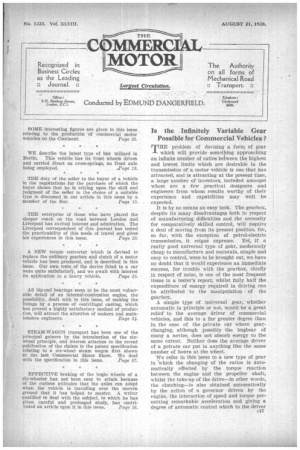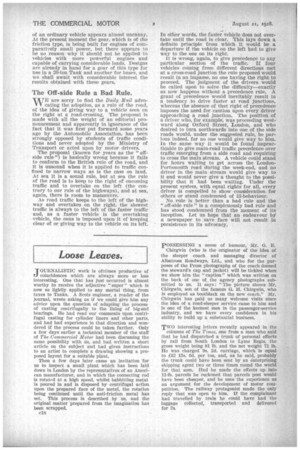Is the . Infinitely Variable Gear Possible for Commercial Vehicles ?
Page 1

Page 2

If you've noticed an error in this article please click here to report it so we can fix it.
rr HE problem Of devising a form of gear -11-. which will provide something approaching an infinite number of ratios belween the highest and lowest limits which are desirable in the transmission of a motor vehicle is one -that has attracted, and is attracting at the present time, a large 'number of inventors,,Included amongst whom are a few .practical designers and engineers from whom results worthy of their experience and capabilities may well be expected.
It is by no means an easy task. The gearbox, despite its many disadvantages both in respect of manufacturing difficulties and the necessity for comparatively skilled control, will require a deal of moving from its present position, for, so far, with the exception of petrol-electric transmission, it reigns supreme. Yet, if a really good universal type of gear, moderately cheap to manufacture and maintain, simple and easy to control, were to he brought out, we have no doubt that it would experience an immediate success, for trouble with the gearbox, chiefly .in respect of noise, is one of the most frequent items in a tester's report, whilst fully, half the expenditure of energy required in driving can be attributed to the manipulation of the gearbox.
A simple type of universal gear, whether automatic in principle or not, would be a great relief to the average driver of commercial vehicles, and this to a far greater degree than in the case of the private ear where gearchanging, although .possibly the bugbear of many a novice, does not absorb energy to the same extent. Neither does the average driver of a private car put in anything like the same number of hours at. the wheel.
We refer in this issue to a new type of gear in which the changing of the ratios is automatically effected by the torque reaction between the engine and the propeller shaft, whilst the take-up of the drive—in other words, the clutching—is also obtained automatically by the action of a governor driven by the engine, the interaction of speed and torque permitting remarkable acceleration and giving a degree of automatic control which to the driver of an ordinary vehicle appears almost uncanny. At the present moment the gear, which is of the friction type, is being built for engines of comparatively small power, but there appears to be no reason why it should not be applied to vehicles with more powerful engines and capable of carrying considerable Toads. Designs are already in hand for a gear of this type for use in a 20-ton Tank and another for buses, and we shall await with considerable interest the results obtained with these gears.
The Off-side Rule a Bad Rule.
wE are sorry to find the Daily Mail advocating the adoption, as a rule of the road, of the idea of givinc, way to a vehicle seen on the right at a road-crossing. The proposal is made with all the weight of an editorial pronouncement and apparently in ignorance of the fact that it was first put forward some years ago by the Automobile Association, has been strongly opposed by students of traffic conditions and never adopted by the Ministry of Transport or acted upon by motor drivers.
The proposal (known for years as the " offside rule ") is basically wrong because it fails to conform to the British rule of the road, and It is unsound when it is applied to traffic confined to narrow ways as is the case on land. At sea it is a sound rule, but at sea the rule of the road is to keep to the right of oncoming traffic and to overtake on the left (the contrary to our rule of the highways), and at sea, again, there is room to manceuvre.
As road traffic keeps to the left of the highway and overtakes on the right, the slowest traffic is alwayS to the left of the faster traffic and, as a faster vehicle is the overtaking vehicle, the onus is imposed upon it of keeping clear of or giving way to the vehicle on its left. In other words, the faster vehicle does not overtake until the road is clear. This lays down a definite principle from which it would be a departure if the vehicle on the left had to give
way to the one on its right. •
it is wrong, again, to give precedence to any particular section of the traffic. If four vehicles coming from different directions met at a cross-road junction the rule proposed would result in an impasse, no one having the right to proceed. The judgment of the drivers would be called upon to solve the difficulty—exactly as now happens without a precedence rule. A grant of precedence 'would inevitably result in a tendency to drive faster at road junctions, whereas the absence of that right of precedence imposes the need for caution upon every 'driver approaching a road junction. The position of a driver who, for example, was proceeding westward along Oxford Street, London, and who desired to turn northwards into one of the side roads would, under the suggested rule, be parlous indeed, for no one would give way to him. In the same way it would be found impracticable to give main-road traffic precedence over traffic emerging from a side road and requiring to cross the main stream. A vehicle could stand for hours waiting to get across the LondonPortsmouth road during the week-end, and no driver in the main stream would give way to it and would never give a thought to the possibility that it had been waiting. Under the present system, with equal rights for all, every driver is compelled to show consideration for others or stand condemned of ill-behaviour.
No. rule is better than a bad rule and the "off-side rule" is a conspicuously bad rule and has stood condemned from the moment of its inception. Let us hope that an endeavour bY a newspaper to .save face will not result in persistence in its advocacy,


































